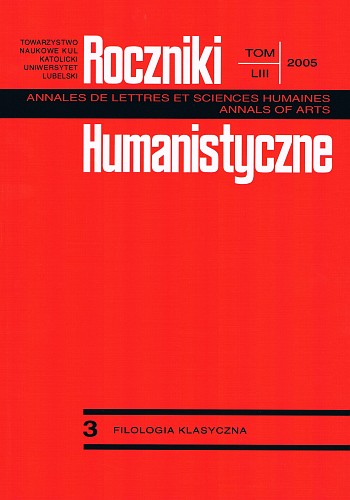Pierwsza relacja sportowa? (Sofokles, Elektra, w. 680-763)
The First Sports Coverage? (Sophocles, Electra, vv. 680-763)
Author(s): Robert R. ChodkowskiSubject(s): History, Language and Literature Studies, Ancient World, Philology
Published by: Towarzystwo Naukowe KUL & Katolicki Uniwersytet Lubelski Jana Pawła II
Keywords: Sophocles; tragedy; sports; sports coverage; chariot races
Summary/Abstract: The author focuses on Educator’s story about the alleged death of Orestes that is found in the very center of Sophocles’ Electra, vv. 680-762). However, this story is interesting for him not as an integral part of the tragedy but as a kind of sports report of a chariot race. He argues that although the report is not a real coverage of a sports event, we can perceive a kind of prototype for such a report that may be based on a real event, as it contains several elements that we expect from such a report. It brilliantly depicts the atmosphere of sports competitions, the tension prevailing among the competitors, and it shows the changing moods of the spectators present on the hippodrome. Sophocles’ commentator is an expert in the discipline he is talking about, he knows the competitors, their origin, as well as the advantages of particular teams. He can guess the charioteers’ tactical plans and intentions, he knows about how a chariot should be driven, he can transmit a competitor’s joy at his success and the tragedy of his defeat. He does not dazzle the readers with too many details, but he rather refers to their knowledge and experience, leaving a lot of space to their creative imagination. All in all we get a report that maintains a high standard and is brilliantly composed and dramatized and that keeps the readers in suspense, first awakening interest in him, and then evoking strong emotions; it can keep the atmosphere that is created in this way till the very end. The multitude of artistic means that are employed here is subjected to these ends.The Introduction shows earlier attempts at describing sporting events that are found in Homer’s works and in lyrical poets, with particular stress on Pindar’s poems.
Journal: Roczniki Humanistyczne
- Issue Year: 53/2005
- Issue No: 03
- Page Range: 39-60
- Page Count: 22
- Language: Polish

